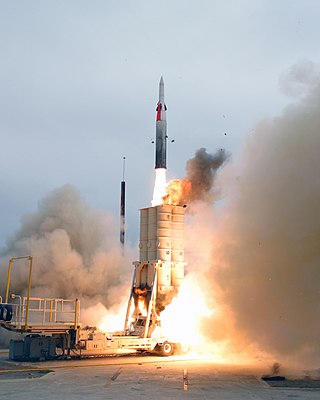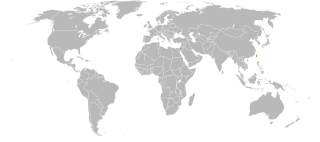
Uzi Rubin (born 1937) is an Israeli defense engineer and analyst.

Uzi Rubin (born 1937) is an Israeli defense engineer and analyst.
Uzi Rubin has been involved in Israeli military research, development, and engineering programs for almost forty years. Between 1991 and 1999, he served as head of Israel's Missile Defense Organization, and in that capacity he oversaw the development of Israel's Arrow anti-missile defense system. He was awarded the Israel Defense Prize in 1996. He is a fellow of the Begin-Sadat Center for Strategic Studies at Bar Ilan University.

The Arrow or Hetz is a family of anti-ballistic missiles designed to fulfill an Israeli requirement for a missile defense system that would be more effective against ballistic missiles than the MIM-104 Patriot surface-to-air missile. Jointly funded and produced by Israel and the United States, development of the system began in 1986 and has continued since, drawing some contested criticism. Undertaken by the MALAM division of the Israel Aerospace Industries (IAI) and Boeing, it is overseen by the Israeli Ministry of Defense's "Homa" administration and the U.S. Missile Defense Agency. It forms the long-range layer of Israel's multi-tiered missile defence system, along with David's Sling and Iron Dome and Iron Beam.
Uzi most commonly refers to an Israeli submachine gun family.

The Shahab-3 is a liquid-propelled medium-range ballistic missile (MRBM) developed by Iran and based on the North Korean Nodong-1. The Shahab-3 has a range of 1,000 kilometres (620 mi); a MRBM variant can now reach 2,000 kilometres (1,200 mi). It was tested from 1998 to 2003 and added to the military arsenal on 7 July 2003, with an official unveiling by Ayatollah Khamenei on July 20. With an accuracy of about 2,500 m CEP, the Shahab-3 missile is primarily effective against large, soft targets. Given the Shahab-3’s payload capacity, it would likely be capable of delivering nuclear warheads. According to the IAEA, Iran in the early 2000s may have explored various fuzing, arming and firing systems to make the Shahab-3 more capable of reliably delivering a nuclear warhead.

The Rafael Python (פיתון) is a family of air-to-air missiles (AAMs) built by the Israeli weapons manufacturer Rafael Advanced Defense Systems, formerly RAFAEL Armament Development Authority. Originally starting with the Shafrir series, the Shafrir-1 missile was developed in 1959, followed by the Shafrir-2 in early 1970s. Subsequently, the missiles were given the western name of "Python" by the parent company for export purposes, starting with the Python-3 in 1978. Since then, it has been further developed and evolved into the Python-4, Python-5, Derby and also, the SPYDER, an advanced ground-based air-defence system. Currently, the missiles are in service with the armed forces of over fifteen countries from around the world.
Rafael Advanced Defense Systems Ltd., is an Israeli defense technology company. It was founded as Israel's National R&D Defense Laboratory for the development of weapons and military technology within the Israeli Ministry of Defense; in 2002 it was incorporated as a limited company.

The NPO Almaz S-200 Angara/Vega/Dubna, NATO reporting name SA-5 Gammon, is a long-range, high-altitude surface-to-air missile (SAM) system developed by the Soviet Union in the 1960s to defend large areas from high-altitude bombers or other targets. In Soviet service, these systems were deployed primarily on the battalion level, with six launchers and a fire control radar.

Uzi Landau is an Israeli politician and systems analyst. He served as a member of the Knesset for Likud between 1984 and 2006, and for Yisrael Beiteinu between 2009 and 2015. He also held several ministerial posts, including Minister of Public Security, Minister in the Prime Minister's Office, Minister of Energy and Water Resources and Minister of Tourism.
The Islamic Revolutionary Guard Corps Aerospace Force or Islamic Revolutionary Guard Corps Air and Space Force is the strategic missile, air, and space force within the Islamic Revolutionary Guard Corps (IRGC) of Iran. It was renamed from the IRGC Air Force into the IRGC Aerospace Force in 2009.

Military relations between Israel and the United States have been consistently close, reflecting shared security interests in the Middle East. Israel is designated as a major non-NATO ally by the U.S. government. A major purchaser and user of U.S. military equipment, Israel is also involved in the joint development of military technology and regularly engages in joint military exercises involving United States and other forces. The relationship has deepened gradually over time, though, as Alan Dowty puts it, it was "not a simple linear process of growing cooperation, but rather a series of tendentious bargaining situations with different strategic and political components in each."

Iron Dome is an Israeli mobile all-weather air defense system developed by Rafael Advanced Defense Systems and Israel Aerospace Industries. The system is designed to intercept and destroy short-range rockets and artillery shells fired from distances of 4 to 70 kilometres (2–43 mi) away and whose trajectory would take them to an Israeli populated area. From 2011 to 2021, the United States contributed a total of US$1.6 billion to the Iron Dome defense system, with another US$1 billion approved by the US Congress in 2022.

Sejil, or Sejjil, is a family of Iranian solid-fueled medium range ballistic missiles. The Sejil are replacements for the Shahab liquid-fueled ballistic missiles. According to US Pentagon sources, the missile profile of the Sejil closely matches those of the Ashura, Ghadr-110 and the Samen. The Sejil-2 was seen in the Great Prophet 15 war games conducted by Iran on 15 January 2021.

The EL/M-2080 Green Pine is an Israeli ground-based missile defense radar produced by Elta Systems, a subsidiary of Israel Aerospace Industries, to operate mainly with the Arrow theater missile defense system of Israel, which is jointly funded and produced with the United States. The system was exported to India, and its advanced version, the Green Pine Block-B, was delivered to South Korea at a cost of $83 million per unit, and to Azerbaijan. The Israeli Air Defense Command within the Israeli Air Force (IAF) of the Israel Defense Forces (IDF) operates both Green Pine radars and Green Pine Block-B radars as an integral part of the Arrow system.

Barak 8, also known as LR-SAM or MR-SAM, is an Indo-Israeli jointly developed surface-to-air missile (SAM) system, designed to defend against any type of airborne threat including aircraft, helicopters, anti-ship missiles, and UAVs as well as ballistic missiles, cruise missiles and combat jets. Both maritime and land-based variants of the system exist.

Missile defense systems are a type of missile defense intended to shield a country against incoming missiles, such as intercontinental ballistic missiles (ICBMs) or other ballistic missiles. The United States, Russia, India, France, Israel, Italy, United Kingdom, China and Iran have all developed missile defense systems.
The defense industry of Israel is a strategically important sector and a large employer, as well as a major supplier of the Israel Defense Forces. The country is one of the world's major exporters of military equipment, accounting for 10% of the world total in 2007. Three Israeli companies were listed on the 2022 Stockholm International Peace Research Institute index of the world's top 100 arms-producing and military service companies: Elbit Systems, Israel Aerospace Industries and RAFAEL. It is also a major player in the global arms market with a 2.3% share of the global exports of major arms as of 2023. Total arms transfer agreements topped $12.9 billion between 2004 and 2011. There are over 150 active defense companies based in the country with combined revenues of more than $3.5 billion annually. Israeli defense equipment exports reached $7 billion in 2012, making it a 20 percent increase from the amount of defense-related exports in 2011. With the war in Ukraine, arms exports reached $12.5 billion in 2022. Much of the exports are sold to the United States and Europe. Other major regions that purchase Israeli defense equipment include Southeast Asia and Latin America. India is also major country for Israeli arms exports and has remained Israel's largest arms market in the world.
The Burkan-2H, or Volcano-2H is a mobile short-range ballistic missile used by the Houthis militants in Yemen. The Volcano H-2 was first launched in July 2017. It is related to the Scud missile family.
The May 2018 Israel–Iran clashes were a series of short military confrontations between Israeli and Iranian forces in Syria. On 10 May 2018 the Israeli military stated that Iranian forces in Syria launched 20 rockets against Israeli army positions on Western Golan Heights. The Syrian Observatory for Human Rights said that the attack occurred after Baath, a town in the demilitarised zone, was bombarded by Israeli forces. According to the Israel Defense Forces (IDF) some missiles were intercepted by Israel's Iron Dome system, while some fell short in Syrian territory.
The Jerusalem Institute for Strategy and Security (JISS) is a conservative think tank that promotes a strong Israel and united Jerusalem. Established in 2017 as the Jerusalem Institute for Strategic Studies, it changed its name to the current one in January 2019.

Israel–Taiwan relations describe the relations between the State of Israel and the Republic of China (Taiwan), which are not official in light of Taiwan's international status, although the two countries have economic and commercial relations, and Israel has an Economic and Cultural Office in Taipei since 1993. The unofficial relations between the two countries are mainly expressed in the fields of science, trade and industry.